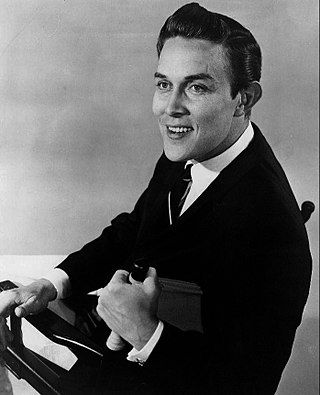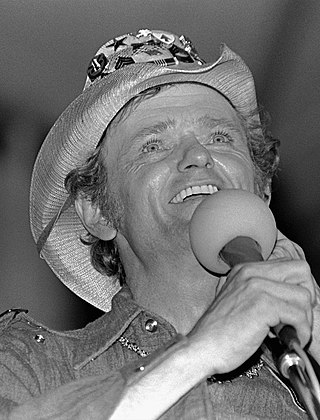
David Allan Coe is an American singer and songwriter. Coe took up music after spending much of his early life in reform schools and prisons, and first became notable for busking in Nashville. He initially played mostly in the blues style, before transitioning to country music, becoming a major part of the 1970s outlaw country scene. His biggest hits include "You Never Even Called Me by My Name", "Longhaired Redneck", "The Ride", "Mona Lisa Lost Her Smile", and "She Used to Love Me a Lot".

Jimmy Ray Dean was an American country music singer, television host, actor and businessman. He was the creator of the Jimmy Dean sausage brand as well as the spokesman for its TV commercials, and his likeness and voice continue to be used in advertisements after his death.

George Glenn Jones was an American country musician, singer, and songwriter. He achieved international fame for a long list of hit records, and is well known for his distinctive voice and phrasing. For the last two decades of his life, Jones was frequently referred to as "the greatest living country singer", "The Rolls-Royce of Country Music", and had more than 160 chart singles to his name from 1955 until his death in 2013.

Ronald Wayne Van Zant was an American singer, best known as the founding lead vocalist and primary lyricist of the southern rock band Lynyrd Skynyrd. He was the older brother of Johnny Van Zant, the current lead vocalist of Lynyrd Skynyrd, and Donnie Van Zant, the founder and vocalist of the rock band .38 Special.
"Poor Poor Pitiful Me" is a rock song written and first recorded by American musician Warren Zevon in 1976.

Jerry Reed Hubbard, known professionally as Jerry Reed, was an American country singer, guitarist, composer, songwriter and actor who appeared in more than a dozen films. His signature songs included "Guitar Man", "U.S. Male", "A Thing Called Love", "Alabama Wild Man", "Amos Moses", "When You're Hot, You're Hot", "Ko-Ko Joe", "Lord, Mr. Ford", "East Bound and Down", "The Bird", and "She Got the Goldmine ".

Charlie McCoy is an American harmonica virtuoso and multi-instrumentalist in country music. He is best known for his harmonica solos on iconic recordings such as "Candy Man", "He Stopped Loving Her Today", "I Was Country When Country Wasn't Cool", and others. He was a member of the progressive country rock bands Area Code 615 and Barefoot Jerry. After recording with Bob Dylan in New York, McCoy is credited for unknowingly influencing Dylan to decide to come to Nashville to record the critically acclaimed 1966 album Blonde on Blonde.

"The Boxer" is a song written by Paul Simon and recorded by the American music duo Simon & Garfunkel from their fifth and final studio album, Bridge over Troubled Water (1970). Produced by the duo and Roy Halee, it was released as a standalone single on March 21, 1969, but included on the album nine months later. The song is a folk rock ballad that variously takes the form of a first-person lament as well as a third-person sketch of a boxer. The lyrics are largely autobiographical and partially inspired by the Bible and were written during a time when Simon felt he was being unfairly criticized. The song's lyrics discuss poverty and loneliness. It is particularly known for its plaintive refrain, in which they sing 'lie-la-lie', accompanied by a heavily reverbed snare drum.

Lonesome, On'ry and Mean is a studio album by American country music artist Waylon Jennings, released on RCA Victor in 1973. It was, after Good Hearted Woman and Ladies Love Outlaws, the third in a series of albums which were to establish Jennings as one of the most prominent representatives of the outlaw country movement. Like its successor, Honky Tonk Heroes, the album is considered an important milestone in the history of country music. It represented the first of Jennings' works produced and recorded by himself, following his fight for artistic freedom against the constraints of the Nashville recording establishment.
Leon Roger Payne, "the Blind Balladeer", was an American country music singer and songwriter.

"Kaw-Liga" is a country music song written by Hank Williams and Fred Rose.

The Blockheads are an English rock band formed in London in 1977. Originally fronted by lead singer Ian Dury as Ian Dury and the Blockheads or Ian and the Blockheads, the band has continued to perform since Dury's death in 2000. As of March 2023 members included Chaz Jankel, Nathan King (bass), Mick Gallagher, John Turnbull, John Roberts (drums), and Mike Bennett. There is a rolling line-up of saxophonists that includes Gilad Atzmon, Terry Edwards, Dave Lewis, and from time to time, the original sax player, Davey Payne. Between 2000 and 2022, the band's lead vocalist and main lyricist was Derek Hussey.

Once Upon a Rhyme is the fourth studio album by American country singer David Allan Coe. It was released in 1975 on Columbia.

I've Got Something to Say is an album released by country musician David Allan Coe. It was released in 1980 on Columbia. Guy Clark, Bill Anderson, Dickey Betts, Kris Kristofferson, Larry Jon Wilson, and George Jones are all featured on this album.

"Song of the South" is a song written by Bob McDill. First recorded by American country music artist Bobby Bare on his 1980 album Drunk & Crazy, a version by Johnny Russell reached number 57 on the U.S. Billboard country chart in 1981. Another cover by Tom T. Hall and Earl Scruggs peaked at number 72 in 1982 from the album Storyteller and the Banjo Man. A cover released in November 1988 by American country music group Alabama, from their album Southern Star, reached number 1 on both the U.S. and Canadian country charts.

...And Then I Wrote is the debut studio album by country singer Willie Nelson, recorded during August and September 1962 and released through Liberty Records.
"Thank God and Greyhound" is a song made famous by American country musician Roy Clark. Written by Larry Kingston and John Edward Nix, the song was released in 1970 as the second single to the album I Never Picked Cotton. The song was a top 10 hit on the Billboard Hot Country Singles chart that November and reached the lower ends of the Billboard Hot 100, peaking at #90.
"You Never Even Called Me by My Name" is a song written by Steve Goodman and John Prine. Prine requested to be uncredited on the song, as he thought it was a "goofy, novelty song" and did not want to "offend the country music community". Goodman released the song on his 1971 debut album Steve Goodman to little acclaim. It was more famously recorded by country music singer David Allan Coe on his 1975 album Once Upon a Rhyme. It was the third single release of Coe's career and his first Top Ten hit, reaching a peak of number eight on the Billboard country singles charts. The song, over five minutes long, is known for its humorous self-description as "the perfect country and western song."
"Do You Wanna Go to Heaven" is a song written by Curly Putman and Bucky Jones, and recorded by American country music artist T. G. Sheppard. It was released in July 1980 as the second single from the album Smooth Sailin'. The song was Sheppard's fifth number one on the country chart. The single went to number one for one week and spent a total of eleven weeks on the country chart.













